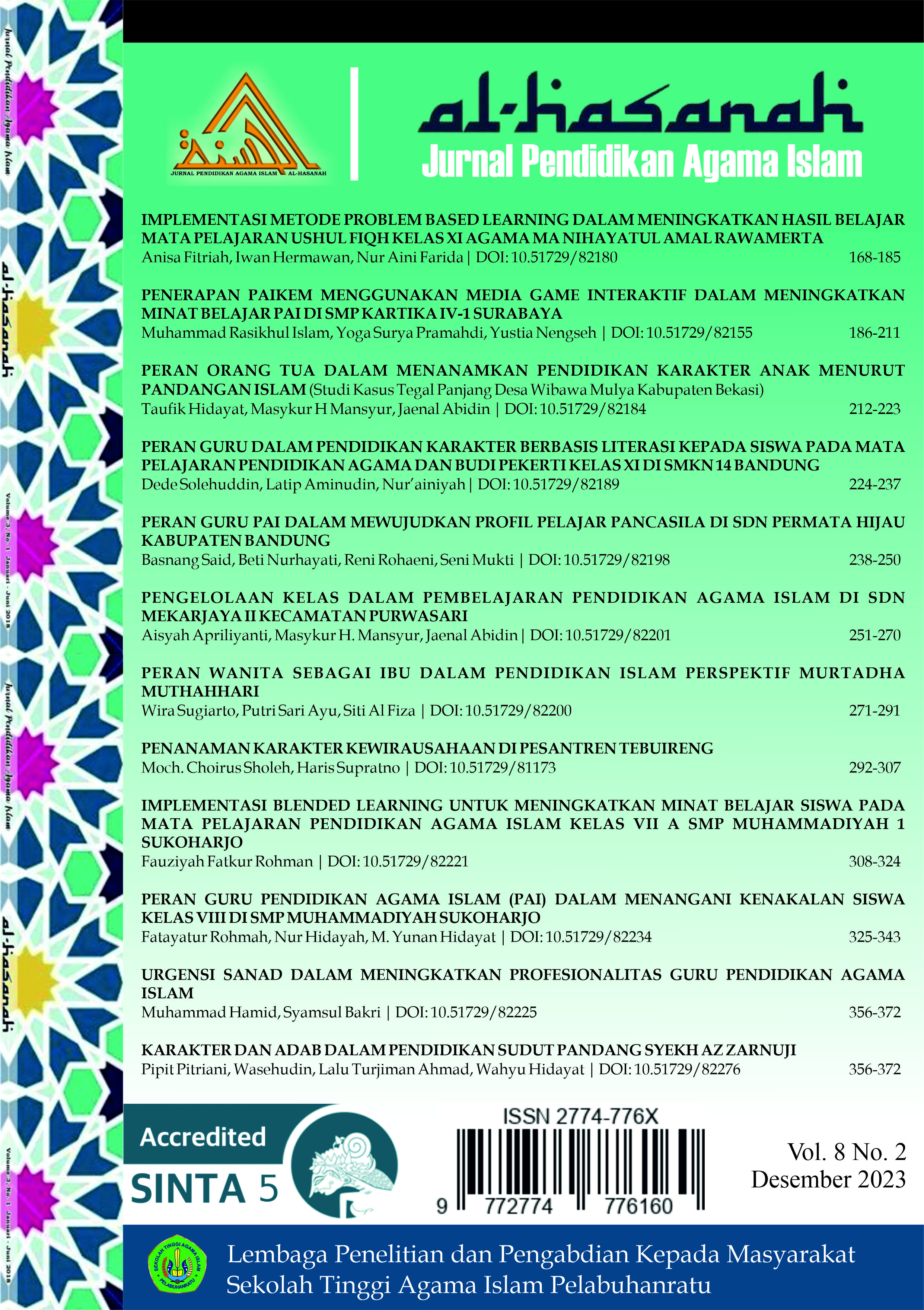PERAN GURU DALAM PENDIDIKAN KARAKTER BERBASIS LITERASI KEPADA SISWA PADA MATA PELAJARAN PENDIDIKAN AGAMA DAN BUDI PEKERTI KELAS XI DI SMKN 14 BANDUNG
DOI:
https://doi.org/10.51729/82189Keywords:
indonesiaAbstract
In an effort to foster character in students through the implementation of literacy-based character education. Of course the teacher plays an important role in educating and cultivating good character in his students. This will greatly affect the smooth process of implementing this literacy-based character education. One of them is by continuing to move to find strategies and methods that are considered effective in solving this problem. The application of character education in schools is carried out in different ways based on needs. Because every child has a different character from one another. Therefore this should be a serious concern in realizing this literacy-based character education. The purpose of writing this article is to find out the teacher's role in literacy-based character education for students in the subject of Islamic Religious Education. This approach uses a qualitative descriptive analytical method. The results of the study can be concluded that Islamic religious education teachers can instill literacy-based character education in programmed activities such as the learning process in the classroom, as well as non-programmed activities outside of learning hours such as programs or events held by schools, or organized by various organizations or extracurriculars .
Downloads
References
Adu, L. (2014) „Pendidikan Karakter dalam Perspektif Islam‟, Jurnal
Abidin, Yunus, dkk. 2017 Pembelajaran Literasi Strategi Meningkatkan Kemampuan Literasi Matematika, Sains, Membaca dan Menulis. Jakarta : Bumi Aksara
A, Doni Koesoema 2010. Pendidikan Karakter strategi mendidik dizaman global. Jakarta: Grasindo
A Gong, Gol dan Agus M. Irkham. 2012. Gempa Literasi: dari kampung untuk nusantara
Agus Wibowo (2012) „Pendidikan Karakter Strategi Membangun Karakter Bangsa Berperadaban, (Yogyakarta:Pustaka Pelajar, 2012)‟.
Ali, Hasanuddin dan Purwandi, L. (2017) Millennial Nusantara, Pahami Karakter, Rebut Simpatinya. Jakarta: PT Gramedia Pustaka Utama.
Arifin, M. (2009). Ilmu Pendidikan Islam (F. Asy (ed.); 4 ed.). PT. Bumi Aksara.
Darmiyati Zuchdi, Zuhdan Kun Prasetya, dan M. S. M. (2010) Pengembangan Model Pendidikan Karakter Terintegrasi Dalam Pembelajaran Bidang Studi Di Sekolah Dasar‟, Jurnal
Desmita, D. (2009) Psikologi perkembangan peserta didik..
E.Mulyasa. 2011. Manajemen Pendidikan Karakter. Jakarta: Bumi Aksara.
Faradiana, Nindya. 2017. Pengaruh Program Gerakan Literasi Terhadap Minat Bca Siswa di SD Islam Terpadu Muhammadiyah Annajah Jatinom Kelaten. Jurnal Hanata Widya.
literasi (Donald, 1991).Penguatan Pendidikan Karakter (PPK).
Ibrahim, G.A. dkk. (2017). Peta Jalan Gerakan Literasi Nasional. Jakarta: kemendikbud.
Mahubbi M (2012) PENDIDIKAN KARAKTER implementasi aswaja sebagai Pendidikan Karakter, Yogya: Pustaka Ilmu.
Moh Uzer Usman, menjadi Guru Profesional, (Bandung:PT. Remaja Rosdakarya, 2005).h. 6
Muhaimin, P. P. I. (2004). Paradigma Pendidikan Islam: Upaya Mengefektifkan Pendidikan Agama Islam di Sekolah. In Bandung: PT Rosda karya.
QS, Asy Syams ayat 8 tentang Kebaikan Dan Keburukan Pada Diri Manusia.
T. Ramli, 2003. Pendidikan Karakte. Bandung: Aksara.
Undang undang No. 14 tahun 2005 tentang guru dan dosen.
Widiastono, Tony D., (ed), Pendidikan Manusia, Jakarta: Buku Kompas, 2004.
Downloads
Published
How to Cite
Issue
Section
License
Copyright (c) 2023 Dede Solehuddin, Latip Aminudin, Nur’ainiyah

This work is licensed under a Creative Commons Attribution 4.0 International License.
Authors who publish with this journal agree to the following terms:
- Authors retain copyright and grant the journal right of first publication with the work simultaneously licensed under a Creative Commons Attribution 4.0 International License. that allows others to share the work with an acknowledgement of the work's authorship and initial publication in this journal.
- Authors are able to enter into separate, additional contractual arrangements for the non-exclusive distribution of the journal's published version of the work (e.g., post it to an institutional repository or publish it in a book), with an acknowledgement of its initial publication in this journal.
- Authors are permitted and encouraged to post their work online (e.g., in institutional repositories or on their website) prior to and during the submission process, as it can lead to productive exchanges, as well as earlier and greater citation of published work.

















